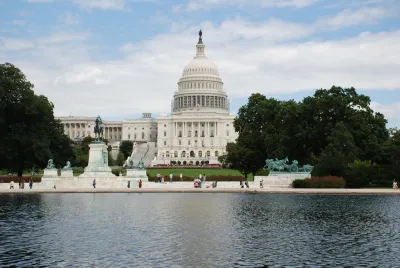Aid dollars not yet distributed to states and cities could be part of a Congressional ‘clawback,’ prompting concern from local leaders.

Some funds directed to local governments as part of the $1.9 trillion American Rescue Plan Act (ARPA) could be rescinded as part of Congressional negotiations to raise the debt ceiling, raising concerns among state and local leaders. As Kery Murakami reports in Route Fifty, local leaders say the move to take back funding still in the Treasury Department’s possession could lead to an erosion of trust between officials at different levels of government.
“Detroit Democratic Mayor Mike Duggan, for instance, urged other mayors at a meeting of the U.S. Conference of Mayors last month to quickly spend the money before it could be taken away,” although a House aide clarified that no funding already distributed to local governments would be taken back. “According to a Brookings Institute tracker, the nation’s 329 largest local governments in the country had budgeted 67.8% of the $44 billion of their ARPA funding they’re due to receive.”
Denise Winfrey, president of the National Association of Counties, says the ARPA funding isn’t as extraneous as some lawmakers might think. “Before that money, we weren't able to give the breadth of services or the depth of services that we needed to and there was a constant demand.” Today, the need has only grown.
FULL STORY: Local Governments Still Counting on Pandemic Aid Despite Clawback Threat

National Parks Layoffs Will Cause Communities to Lose Billions
Thousands of essential park workers were laid off this week, just before the busy spring break season.

Retro-silient?: America’s First “Eco-burb,” The Woodlands Turns 50
A master-planned community north of Houston offers lessons on green infrastructure and resilient design, but falls short of its founder’s lofty affordability and walkability goals.

Delivering for America Plan Will Downgrade Mail Service in at Least 49.5 Percent of Zip Codes
Republican and Democrat lawmakers criticize the plan for its disproportionate negative impact on rural communities.

Test News Post 1
This is a summary

Test News Headline 46
Test for the image on the front page.

Balancing Bombs and Butterflies: How the National Guard Protects a Rare Species
The National Guard at Fort Indiantown Gap uses GIS technology and land management strategies to balance military training with conservation efforts, ensuring the survival of the rare eastern regal fritillary butterfly.
Urban Design for Planners 1: Software Tools
This six-course series explores essential urban design concepts using open source software and equips planners with the tools they need to participate fully in the urban design process.
Planning for Universal Design
Learn the tools for implementing Universal Design in planning regulations.
EMC Planning Group, Inc.
Planetizen
Planetizen
Mpact (formerly Rail~Volution)
Great Falls Development Authority, Inc.
HUDs Office of Policy Development and Research
NYU Wagner Graduate School of Public Service





























